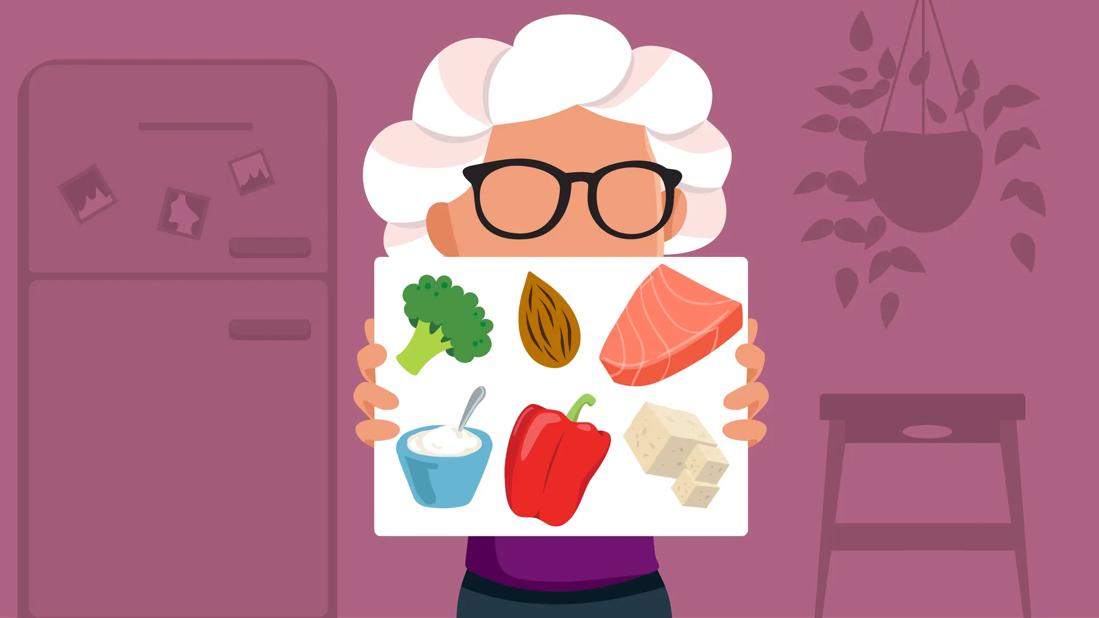Eating enough dairy, fish and leafy greens is a good way to help keep your bones strong

Image content: This image is available to view online.
View image online (https://assets.clevelandclinic.org/transform/6dcb7fa2-48e9-43a8-921b-c89ee2ee46aa/person-food-sign-1904438879)
Person in kitchen holding placard with six foods containing calcium, like tofu, broccoli and almonds
It may be surprising to think that something as solid as bones can be affected by what we eat. But it’s true — our diet impacts our bone health.
Advertisement
Cleveland Clinic is a non-profit academic medical center. Advertising on our site helps support our mission. We do not endorse non-Cleveland Clinic products or services. Policy
“Bones are just like any other body part,” explains registered dietitian Julia Zumpano, RD, LD. “We grow, build and support our bones with the food we eat. And we can damage them by the food we eat. It can certainly go both ways.”
Believe it or not, our bones are living tissues that constantly grow and change throughout our lives. Because of this, they’re mostly able to take care of themselves. But as Zumpano points out, certain health conditions like osteoporosis can cause your bones to become more brittle and weak.
“We have a little over 200 bones in our body,” she explains. “Their job is to give our body shape and protect our internal organs. They help us perform every movement we make every day.”
As strong as our bones are, they’re not invincible. You want to take care of your bones so they can care for you. So, what are the best foods for your bones? A glass of milk is a good start, but it takes more than that. Zumpano shares the best type of diet for bone health.
Video content: This video is available to watch online.
View video online (https://cdnapisec.kaltura.com/p/2207941/sp/220794100/playManifest/entryId/1_flescy2a/flavorId/1_5f3sgelj/format/url/protocol/https/a.mp4)
As a kid, you may remember being told that finishing your milk can give you strong bones because it contains a mineral called calcium. This is still true, but you may not know that many other nutrients contribute to optimal bone health.
Advertisement
“Some are bigger hitters than others, but really maximizing all of your nutrients is important,” Zumpano points out.
Vitamins and minerals that work together to help protect your bones include:
Another good thing to remember is that many of the vitamins and nutrients your bones need can be found in a variety of foods. So, no, you’re not just stuck eating only dairy every day. In fact, you can create a whole diet that’s interesting, colorful, and keeps your bones strong and healthy.
“There are a lot of non-dairy fortified foods like orange juice, milk alternatives, and tofu. Plant-based foods that are natural sources of calcium include spinach, sesame seeds and almonds,” shares Zumpano.
Here’s what’s on the menu for good bone health:
Dairy products are a go-to option for bone health. Because dairy is abundant in nutrients like calcium and vitamin D, you’re strengthening your bones with every spoonful of yogurt or sip of milk.
This includes foods like:
“If you don’t tolerate the lactose in dairy products, consider lactose-free varieties or choose plant-based fortified dairy alternatives,” Zumpano suggests.
If it’s green and leafy, your bones will probably love it. Leafy vegetables are a rich source of calcium, magnesium and vitamin K.
This includes fruits and vegetables like:
In addition, fruit can help by supporting collagen production, which can help keep bones strong. Especially those with tons of vitamin C like:
Advertisement
Vitamin D is abundantly found in fish. Studies have also shown that fish can help strengthen bone quality and possibly prevent bone decay. But you’ll want to focus more on cold-water fish, Zumpano clarifies.
This includes fish like:
“Fish is also a phenomenal source of protein, as well as vitamin D,” she adds. “So, you’re getting both benefits.”
They’re small but they make a big impact. When it comes to bone health, many nuts and seeds provide calcium, magnesium and even a good dose of healthy fats.
Some of the best nuts to eat for bone health include:
Not sure how to work these into your diet? Nuts can be a great healthy snack or a perfect topping for a salad, soup or even dessert.
Soy products are rich in calcium and protein, making them beneficial for bone health, especially if you’re following a plant-based or non-dairy diet.
Soy products you can work into your diet include:
While some foods can help build bones up, others can cause problems. If you’re really trying to rethink your diet to maximize your bone health, there are a couple things you should keep out of your meals.
Advertisement
Some of the foods you should avoid to maintain healthy bone health include:
Advertisement
If you’re looking to keep your bone health in check, your diet is a big part of it. Making sure you get enough nutrients like calcium, vitamin D, vitamin K, magnesium and omega-3 fatty acids can help improve bone strength and density, and possibly prevent osteoporosis.

Sign up for our Health Essentials emails for expert guidance on nutrition, fitness, sleep, skin care and more.
Learn more about our editorial process.
Advertisement
Some osteoporosis medications help slow bone breakdown, while others help grow new bone — what’s best for you depends on your needs
It’s best to aim for calcium-rich foods instead of turning to supplements
The right exercises can protect you from future fractures
Diseases, other factors can increase men's risk
Keto can reduce blood sugar, but that doesn’t mean it’s right for everyone
Cravings are a natural response to hormonal changes, but giving into them may make you feel worse
Alternating between periods of eating and fasting may benefit your health
This once-common treatment for arthritis is regaining popularity in the United States
Although it could be used as a moisturizer, this new trend is not recommended
Communicating clear limits helps protect your time, energy and emotional well-being
High cholesterol can be genetic, but testing and treatment can lower your heart disease risk